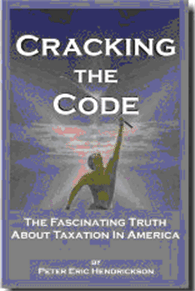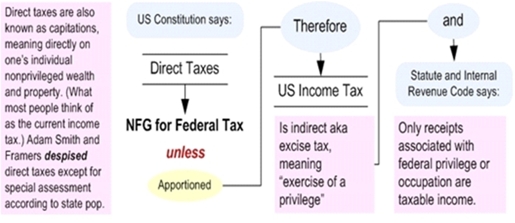

|
 |
|
|
Cracking the Code
|
Please go to the new Coffee Coaster site implemented more gracefully in Wordpress. Full conversion by 9/12. This page: http://brianrwright.com/CoffeeCoasterBlog/?p=984 |

Three things cannot be long hidden: the sun, the moon, and the truth — the Buddha
For a book that rather prosaically walks the reader thru centuries of political principles, statutes, and regulatory code pertaining to the American federal "income" tax (FIT)[1], Cracking the Code (CtC) is exceptional in so many ways. I especially want to draw the connection between concrete tax resistance or defiance—or in the case of Pete's book on the FIT, accurate tax definition—and the worldwide movement toward adoption of the simple nonaggression principle in civil societies.
My book, The Sacred Nonaggression Principle (SNaP), paints the broader strokes of this latter nonaggression movement of moral conscience; it basically seeks to deaggress the world (in a duly prompt and orderly manner) particularly the governments of the world... which are responsible for 99.999999% of the world's initiation of deadly physical force. From my perspective, and from the perspective of any radical libertarian, taxation—defined as the systematic, forceful extraction of wealth from individuals for government purposes—is morally wrong.
And so is any other act of coercion.
Although my own personal mission is to render all aggression a relic of our barbarous past, I want to do whatever I can to practically mitigate or roll back particularly obnoxious or lethal instances of real-time, right-now aggression, such as coercive taxation... such as the FIT. My recent column, "April 15: What would Jesus do?," describes my thinking on how to best deal with the FIT, first from a moral standpoint, then from a practical one. I mention Cracking the Code in reference to the latter.
One of the stirringly unique aspects to Cracking the Code, is the way Mr. Hendrickson seamlessly weaves the ethical foundations of our political system into practical tools for holding our government and the FIT to the rule of law. This union of the moral and the practical promises to bring a virtually unquenchable flame of common-sense Constitutional liberty to the dying embers of what was once a glowing American republic.
Regarding the unassailability of common sense: My friend in the Free State, Matt Simon[2], argues: "Stake out and hold the moral high ground. Eventually, through education and political action, what is moral becomes common sense. Common sense wins... as shown from the work of the same name by Thomas Paine, or from the writings of Harriet Beecher Stowe (Uncle Tom's Cabin), or from Gandhi's walk to the sea.
Although Pete doesn't delve into ethics from any particular humanistic or theistic tradition, he accommodates the realm of the "oughts of behavior" in social systems quite deftly. How? By laying out what some key founding fathers and their philosophical peers thought were base principles of civilized, workable society. In a nutshell, these principles were the Rights of Man—rights of the individual to person, to property, to peaceful enjoyment of activity and custom. These men painstakingly, and at great personal cost, created a system of government whose purpose was to secure these Rights. They codified the system in a written constitution.
There are two distinct classes of men... those who pay taxes and those who receive and live upon taxes. — Thomas Paine
That's a highly moral grounding, the Rights of Man. (Sounds a lot like the SNaP, doesn't it?) This fundamental notion that we not coerce one another, rather that we behave in voluntary relationships, finds its way into the foundation of proper law: individual sovereignty... which was a popular formulation back in the day of our country's birthing. Pete has a passage that articulates these sovereign pillars as well as anything I've read in the literature of liberty:
"A sovereign is a free-standing, independent agent, whose right to exist and act are inherent in nature. The simple and incontrovertible facts are:
- No human being can assert a claim of authority by right over any other human being
- All human agencies are merely subordinate constructs which can claim no authority beyond that of their creators; furthermore, such agencies can assert nothing for themselves, and assertions made on their behalf can have no demonstrable standing beyond that of the speaker or speakers—who are just other human beings
- No one can claim rights superior in quantity or quality to those of anyone else
"Therefore, regardless of whether or not each of us really has a right to act freely, no one else has a right to interfere with our acting freely. So, we are all sovereign by default at least, if not by design. Our power to act is not dependent upon or answerable to any other person or any other person's creation."
Then the book follows up with the origin of the law through the legislative process, which in turn derives its legitimate authority from the people who are sovereign actors. Just as others cannot violate the sovereign rights of the individual—no matter how great their number—so, too, neither can the legislature and its laws. The purpose of the law is to secure individual rights not to discard them. Any law that violates rights is null and void.
In conjunction with the discussion of the roots of law—actually in the very first chapter—the author presents the distinction between direct and indirect taxes. It's a highly important distinction, and no less a light than Adam Smith, in The Wealth of Nations, rails against direct taxes:
"Smith deplores capitations [direct taxes] as inequitable, inflationary, counterproductive, and destructive of liberty. Importantly, he makes clear that any tax levied upon and/or measured by the exercise of a basic [sovereign] right—such as the right to life, liberty, the ownership of property, working, or engaging in a trade—is a capitation. Indeed, capitations are alternatively known as (and get their name from) "head taxes," because they fall directly upon the head of the citizen. They must be paid by the citizen, and out of his own funds—simply because he is there exercising his natural powers."
Hendrickson then points out that the framers of the Constitution were avid and serious fans of Smith's hugely popular work; they specifically prohibited direct taxes, except by apportionment among the states (and such apportioned direct taxes were thought to be only appropriate as exceptional levies in times of war or other emergencies).
None of the federal "income" tax (FIT) acts passed since 1862 have ever been defined as direct taxes, either by their proponents or in the legal language of the statutes enacting them. Indeed, income has a very narrow definition by the statutes as pertaining to receipts from federally privileged activity, such as federal employment or office-holding. To me, the overwhelming discovery by Pete Hendrickson, after taking advantage of the recent ability to search by computer the several million words of statute and internal revenue code, is (paraphrasing from page 3):
Any exchange of value that is measured by the exercise of a basic [sovereign] right—such as the right to life, liberty, the ownership of property, working, or engaging in a trade—is a nonprivileged transaction. It is, in absolutely verifiable fact, not income as scrupulously defined in numerous places in the statutory and regulatory documents. Thus it is not subject to a levy by the federal government. Privileged income—received from federal office or federally privileged financial activities—however, is subject to the "income" tax.
So the essential argument is that FIT is fully constitutional[3], but as a nondirect tax it does not have application to the financial transactions of the vast majority of Americans. The rest of the 232 pages of Cracking the Code consists mainly of a freshly written elaboration of some of the finer points pertaining to meanings of important terms and thorough documentation of all the relevant law, including Supreme Court rulings.
In my "April 15: What would Jesus do?" column I give the following graphic as my take on the flow of the CtC description:

It's likely that I haven't understood 100% what Hendrickson is setting forth, but I do plan to reread the book and join some study groups to look at all the angles of what the law truly means... not what that 'man behind the curtain' huffs and puffs and tells me it means.
When I observed that Cracking the Code is primarily a legal description, I didn't want to give readers the impression that Pete is not arguing his case from a sturdy, invigorating moral foundation. Indeed, his prose acquires the quality of poetry when he articulates our inalienable rights and the need for us as Americans to physically insist upon them.
Also recall from
"April 15: What would Jesus do?" that were I personally to decline to participate in the FIT process at some point—and believe me, I'm as fundamentally chicken-shit as all these friends of mine who recoil in horror that anyone would even imagine not bowing and scraping to the 'edicts of the king'—I would come at it in two stages:
But as afraid as we may be, does that excuse us from fighting for liberty, fighting for the moral and legal integrity of our country? These are the kinds of questions one naturally asks during the reading of Cracking the Code. Before we let the king's men fully forge the chains of tyranny between our ears, Pete reminds us that a little Patrick Henry is in order.[4]
Today we stand at the threshold of a radical transformation of society from one of coercion and aggression to one of freedom, peace, and abundance. There are so many organizations arrayed against the <central controlling entity> from which excrescences such as the FIT (as commonly practiced and applied by the money power) emerge. I'm finding, in particular, 'my kind of people' run through and through the Restore the Republic group... more or less an offshoot of the Aaron Russo cause and the Ron Paul campaign.
It's gratifying and rewarding to know there are others who will not submit to chains and slavery, and I'm willing to bet a whole bunch of them are done being verbal libertarians... as we talk, they're walking the walk.
I want to especially praise Mr. Hendrickson's contribution to restoring the republic. You will see from the outset that he writes from a place of deep inner peace and passionate love for country. Regardless of any imminent measures of oppression to be unleashed upon us as individuals, I now know the American patriots will prevail. [My next column will discuss the real prospects of full, operating freedom in our time.] Thanks so much, Pete; you have given us vital knowledge in the task of our liberation.
Ten stars.
[All right, 9 1/2: I would have preferred different text formatting, especially in the legal citings.]
Special Disclaimer and Advisory
Note, those who have usurped the federal government—and it looks as if the latest usurpers are the large corporate financial institutions—have zero interest in implementing valid objective laws, however sacrosanct or healthful they are to the people. So if you personally decide to stand up for objective law—not to mention individual freedom—by not sending in a check, these people are not going to like that. You can count on some major headaches, etc.
One should prepare oneself legally to the best of one's ability, and also prepare psychologically. It's best if you can work through a freedom-support community such as those available through the CtC site.
[I should point out that thousands of citizens who have read CtC and filed appropriate forms have received refund checks from the treasury. Astounding but true, the total amount publicized through the CtC site is nearing $10 million. That also shows the Agency knows the law and has been conforming to it, in the main. In these troubled times, why not retrieve some of the money you're entitled to?]
I personally think that any dire circumstances will be exceptional and applied selectively to those who appear to be leaders. Further, any such acts of federal tyranny will be redressed and compensation/ restitution rendered upon the achievement of the Constitutional Restoration (CR). If the CR fails, then you really won't have lost anything, because the curtain will have fallen. And in fact by getting in early you will probably be grandfathered into improved conditions of incarceration vs. the broad mass of people who will be sent to the Gulag later... don't expect any special deals to be cut for those who bow their heads and grovel continuously.
###
[1] The quotes around income suggest that the common meaning is not the possibly not the correct meaning.
[2] Matt is the leader of NHCommonSense.org and NHCompassion.org advocating for common-sense rules for marijuana in society.
[3] Some well-known personalities questioning the FIT—from Lynn Johnston to Irwin Schiff—have contended that the FIT is unconstitutional and made other claims... with mixed results. But the government quashes claims of unconstitutionality and generally behaves like a monarchy of arbitrary rule.
[4] For a PDF introduction to Cracking the Code, please click on this link. I feel it is vitally important for the freedom movement that Pete's book be read by millions of people, and quickly. The Oligarchy, of course, blusters along desperately trying to thwart this new, genuine threat to its power. [Check out this hatchet piece from the NY Times Magazine.] This year promises to hold tax protests throughout the country on a revolutionary scale. The Kleptos are excreting frisbees in trepidation. But they have nothing to fear but justice.

Affiliate Sale
Items
 |
 |
|||
| New Pilgrim Chronicles Forum |